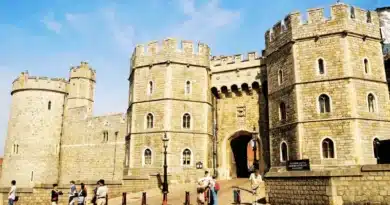Does Windsor Castle Have a Swimming Pool?
Windsor Castle has a swimming pool created by converting the Orangery. The Orangery originally housed 34 orange trees, which Charles X of France gifted to George IV. Over time, this space has been adapted and now functions as a swimming pool within the castle grounds.
Key Takeaways
| Key Takeaway |
|---|
| Windsor Castle has a swimming pool. |
| The swimming pool was created by converting the Orangery. |
| The Orangery originally housed 34 orange trees given to George IV by Charles X of France. |
| The swimming pool is located within the private quarters of the castle and is not accessible to the public. |
| The pool is for the exclusive use of the Royal Family and their guests. |
| The conversion of the Orangery into a swimming pool reflects the castle’s adaptation to modern needs while preserving its historical character. |
| The East Terrace Garden, where the Orangery is located, is not regularly open to the public, with access usually limited to special occasions or guided tours. |
| The East Terrace Garden was designed by Jeffry Wyatville during the reign of George IV. |
| The garden contains approximately 3,500 rose bushes, a bronze lotus-shaped fountain, and classical statues. |
| During the Second World War, the East Terrace Garden was used to grow vegetables. |
| Buckingham Palace also has a private indoor swimming pool. |
| The Orangery features classical architectural elements typical of the early 19th century. |
| The bronze statues in the garden depict classical gods and a Roman gladiator, originally belonging to King Charles I. |
| Prince Albert played a key role in redesigning the East Terrace Garden during Queen Victoria’s reign. |
| The East Terrace Garden was opened to the public in the summer of 2020 for the first time in over 40 years and again in the summer of 2021. |
Introduction
Windsor Castle, one of the most renowned and historic royal residences in the United Kingdom, has captivated the world for centuries with its rich history, architectural grandeur, and royal significance. Among its numerous intriguing features, the presence of a swimming pool within the castle premises is a topic of interest that blends modern amenities with royal traditions.
Historical Context
Windsor Castle’s origins date back to the 11th century, when it was established by William the Conqueror. Over the centuries, it has evolved through extensive renovations and additions by successive monarchs.
One lesser-known aspect of Windsor Castle’s history involves its orangery, a space originally designed to house orange trees, which were a gift from Charles X of France to George IV. This orangery was pivotal in the transformation that created a swimming pool within the castle’s private quarters.
Conversion to a Swimming Pool
The transition from an orangery to a swimming pool has been suggested to provide modern recreational facilities for the royal family, ensuring their comfort and privacy. This aligns with the castle’s long-standing tradition of adapting to contemporary needs while preserving its historical essence. The pool is believed to be situated within the private quarters, shielded from the public eye and media scrutiny, thus maintaining the privacy that the royal family requires.

Usage
If a swimming pool exists at Windsor Castle, it would be exclusively for the use of the royal family and their esteemed guests. This private amenity underscores the castle’s role not only as a symbol of British heritage but also as a functional residence catering to the personal needs of its occupants. The pool would offer a serene retreat for the royals, away from their public duties and engagements.
Privacy and Security
Windsor Castle’s swimming pool is strategically located to ensure maximum privacy. Nestled within the private areas of the castle, it is inaccessible to tourists and the general public. This seclusion is paramount given the royal family’s need for security and discretion in their personal lives. The pool area is likely guarded and monitored to prevent any privacy breaches.
Maintenance and Conservation
Maintaining Windsor Castle requires meticulous attention to both its modern amenities and the integrity of the historic structure. Regular maintenance routines keep all facilities in pristine condition. These efforts are carefully balanced to ensure the castle’s historical elements remain unaltered. This dual focus on modern functionality and historical preservation is a hallmark of the castle’s ongoing upkeep.

Architectural Significance
Windsor Castle’s architecture is a testament to nearly a millennium of British history. Adapting historic buildings to meet contemporary needs while retaining their traditional character is common practice. This blend of old and new is evident throughout the castle, from state apartments to private areas.
Modern-Day Role
Today, Windsor Castle serves as a royal residence and a venue for state functions and ceremonies. The castle’s dual role as both a historical monument and a living home for the royal family illustrates how it has been continually adapted to support the lifestyle of its inhabitants while preserving its cultural and historical significance.

Conclusion
Integrating modern amenities within Windsor Castle is a fascinating example of how contemporary needs are met in a site of immense historical importance. These features serve the personal needs of the royal family, providing private spaces for relaxation and leisure. This ongoing evolution balances preserving its rich heritage with the requirements of contemporary living. Through meticulous maintenance and careful conservation, Windsor Castle remains a living testament to British history, seamlessly blending the past with the present.
FAQ
What was the original purpose of the Orangery at Windsor Castle?
The Orangery was initially built to house 34 orange trees, a gift from Charles X, King of France, to George IV. Orangeries were fashionable among European royalty, symbolising wealth and status and providing a controlled environment for exotic plants.
When was the Orangery converted into a swimming pool?
The Orangery was converted into a swimming pool during George IV’s reign (1820–1830). This transformation reflected the king’s desire for modern amenities within the royal residence, aligning with contemporary trends among European nobility.
Can visitors to Windsor Castle see the Orangery swimming pool?
The Orangery is part of the East Terrace Garden, which is not regularly open to the public. Access is typically restricted to special occasions or guided tours. For instance, the garden was opened to visitors during the summer of 2021.
Who was responsible for the design of the East Terrace Garden?
The architect Jeffry Wyatville oversaw the design of the East Terrace Garden during George IV’s reign. Wyatville was renowned for his work on royal residences, including significant contributions to Windsor Castle’s architecture.
What other features are present in the East Terrace Garden?
The garden contains approximately 3,500 rose bushes and a bronze lotus-shaped fountain designed with the involvement of Prince Philip. These elements contribute to the garden’s formal aesthetic, complementing the castle’s east façade.
Has the East Terrace Garden been used for any significant events?
Yes, the East Terrace Garden has been the backdrop for various significant events. For example, it was opened to the public for the first time in over 40 years during the summer of 2020, allowing visitors to appreciate its historical and horticultural significance.
What is the historical significance of the bronze statues in the garden?
The bronze figures are classical gods and a Roman gladiator, cast in Rome in the 1630s for King Charles I. They were originally displayed in gardens at St James’s Palace and Whitehall Palace before being relocated to Windsor, reflecting the monarchy’s appreciation for classical art.
Did the Orangery serve any purpose during World War II?
During World War II, the East Terrace Garden’s flowerbeds were repurposed for vegetable cultivation due to food shortages. Princess Elizabeth and Princess Margaret had their own plots, contributing to the war effort and promoting self-sufficiency.
What changes did Prince Albert make to the East Terrace Garden?
Prince Albert redesigned the garden during Queen Victoria’s reign, actively involving himself in its layout and planting schemes. His contributions included introducing formal flowerbeds and enhancing the garden’s overall design, reflecting his interest in horticulture.
Are there any other swimming pools in royal residences?
Yes, Buckingham Palace has a private indoor swimming pool, which King George VI commissioned in 1938. This facility was intended to provide a private space for the royal family to swim away from public attention.
What is the architectural style of the Orangery?
The Orangery at Windsor Castle features classical architectural elements typical of early 19th-century design, including large windows to maximise sunlight for the orange trees. Such structures were often adorned with decorative details reflecting the grandeur of the period.
Has the Orangery been featured in any public events or media?
There is limited public information about the Orangery’s appearance in events or media. Its private nature and restricted access have kept it relatively obscure in popular representations of Windsor Castle.
What other structures are located near the Orangery in the East Terrace Garden?
The East Terrace Garden includes features such as the bronze lotus-shaped fountain and various classical statues. Additionally, the garden’s layout comprises formal flowerbeds and clipped yew domes, enhancing its aesthetic appeal.









